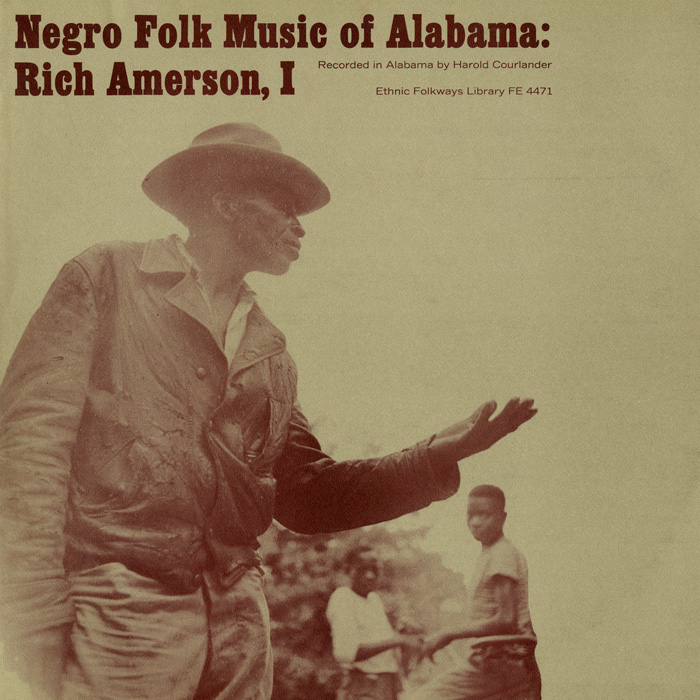RICH AMERSON

From the Negro Folk Music of Alabama: Rich Amerson, Vol. 1...Ethnic Folkways Library FE 4421.
Recorded in central and western Alabama by Harold Courlander, in January and February 1950. Rich Amerson accompanied by his sister Earthy Anne Coleman.
Richard Manuel Amerson was born on a farm a few milles from Livingston, Alabama, sometime between 1885 and 1890. He is known to relatives as Manuel, and to his sister Earthy Anne Coleman, who is also heard on these recordings, as Bud. By occupation, Rich Amerson has been farmer, lumberjack, track-liner, storm pit builder, well taster and lay preacher. "Anything all that man has to do to keep on living, I can do it, " he says. "I preach the Gospel, I can moan and groan, I can counteract conjur stuff, and I can play my mouth harp. And I can look and I can see that's the higgest part of it all. Livingston County is full of people looking back and forth, but what do they see, I ask you? And do they understand what they see? What good is to be born if you don't see, and if you don't understand what you see? In the ordinary sense I can't neither read nor write. But the sense God gave you don't depend altogether on schooling. I was schooled in hard work, and I read with a hoe and write with a plow." Though illiterate, Rich knows the Testament backwards and forwards, and he is able and ready to preach or sing on almost any Biblical allusion or theme.
His mind is filled with legends and tales of the old South that most of his people have long forgotten, and with riddles, animal tales, tall tales, and personal adventures to which he has imparted a flavor of the ridicilous or profound ethical values. Above all, Rich Amerson is a true story teller and bard, of a kind that has become exceedingly rare in modern society. He disappears on foot, reappears months later on a bicycle. He goes down to the general store for groceries and is next heard of two years later living in another country.
Rich has been among the poorest of the poor most of his life. "I ain't proud to be poor," he says, "but I ain't too poor to be proud. And I'm not too poor to be rich in values. Music is in everything you see and hear. Railroad, now that's music, isn't it? And church, that's music too, isn't it? And if you come right down to it, music is church too. Some folks, now, they won't sing no sinful songs. The way I see it, if a song is in you you got to sing it, and it's just another aspect of the Holy Spirit. When life is big, music is big." When Rich Amerson sings songs, secular or religious, or tells of his adventures, or dramatizes episodes of the life of Brer Rabbit, he projects not as a public "entertainer" but as interpreter and message bearer. Sometimes he plays the buffon - to disarm and captivate his audience. Then, as likely as not, he gives them "values". His sister Earthy Anne says: "Bud ain't much but breath and britches, but he sure can sing."
Rich Amerson's sister, Earthy Anne Coleman, is two years older than him. She says she got her name because she was "so long growing up from the earth." But Rich says that the two children that came before her died at birth, and that his mother was advised to name the next baby after the earth. "When Annie came, my mother named her Earthy, and she survived."~ Harold Courlander (from the liner notes).
American folklorist Harold Courlander compiled this series in an attempt to break the caricature of black music that was popular in America during the 1950s. Many aspects of the distinct musical styles presented can be traced back to their roots in traditional African music, including the use of handclapping, responsive singing, and falsetto voice. This third volume presents a glimpse into the prophetic mind of Rich Amerson, a rural blues and folk musician, who tells stories of ethics and the old South, Earth and animals, the sermons of nature and human emotions as they have the ability to transcend poverty. This album demonstrates Amerson's belief that "when life is big, music is big."
Liner notes include an explanation of the various influences that helped shape African American music from this time period, as well as a brief biography of Rich Amerson and the album's complete song texts.
Info in :
:format(jpeg):mode_rgb():quality(90)/discogs-images/A-1928829-1457492127-9389.jpeg.jpg)



Comments